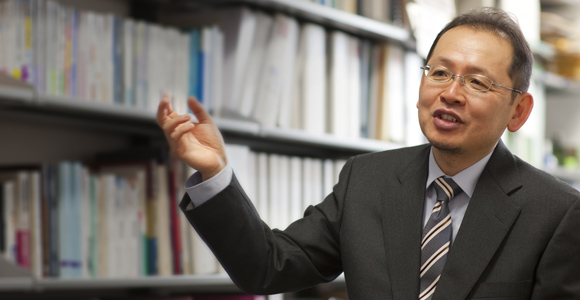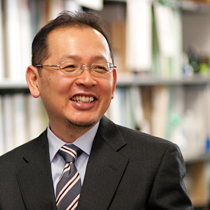Takashi MAENO

I expect SDM graduates to be
world-class leaders in various fields
Takashi MAENO, Ph.D.
Dean and Professor, Graduate School of SDM, Keio University
SDM leads the way in developing world-class leaders
The Graduate School of System Design and Management (SDM) helps students fosters the skills required to take a comprehensive view of a system and to accurately design it at the same time, regardless of the students' areas of expertise. Therefore, Professor Takashi Maeno believes that students can apply these skills in any area. He wants SDM graduates to follow the words of Yukichi Fukuzawa-sensei, the founder of Keio University, and become ambitious trailblazers and world-class leaders in corporations, research institutes, public organizations, NPOs and NGOs, in order to create a better world.
Technology and social science build up SDM curriculum
In SDM, students learn of the two pillars of System Design and Management; systems engineering and social science systems. In systems engineering, students learn about requirement engineering, system architecture, system design, detailed design, and verification and validation of each design. In social science, the focus is on science and philosophy of systems, and ethics for systems design engineering. Including social science and humanities, which are not conventionally included in systems engineering, helps students to design various systems to meet society's needs, such as environmental friendliness and security.
Students write a master thesis on their own project topics in their second year building on the knowledge they acquired in their first year from the study of specific subjects.
Diversity, from basics to leadership, from technology to politics
 In Japan, while most professional graduate schools emphasize the study of specific subjects and most graduate schools for science and technology focus on research, SDM achieves a balance.
In Japan, while most professional graduate schools emphasize the study of specific subjects and most graduate schools for science and technology focus on research, SDM achieves a balance.
At first, students study specific subjects, then they engage in the world's most advanced research. SDM achieves both a social contribution by producing good research outcomes and an educational contribution by helping students to grow as individuals and as leaders.
Four core classes teach the basics of systems engineering, which is one of the two pillars of SDM. The design project, ALPS, provides an opportunity to apply the knowledge acquired in these core classes. In ALPS, students form groups which follow a set format; define the problems, learn the requirements of the interested parties, set system requirements, design concepts, propose architecture, repeatedly test and prototype, and then verify recommendations. Students can acquire globally applicable communication skills, project management skills, and leadership skills presentation skills as well as the basics of systems engineering. They choose additional classes from a wide range of electives, including classes on various technologies, politics, philosophy and ethics.

